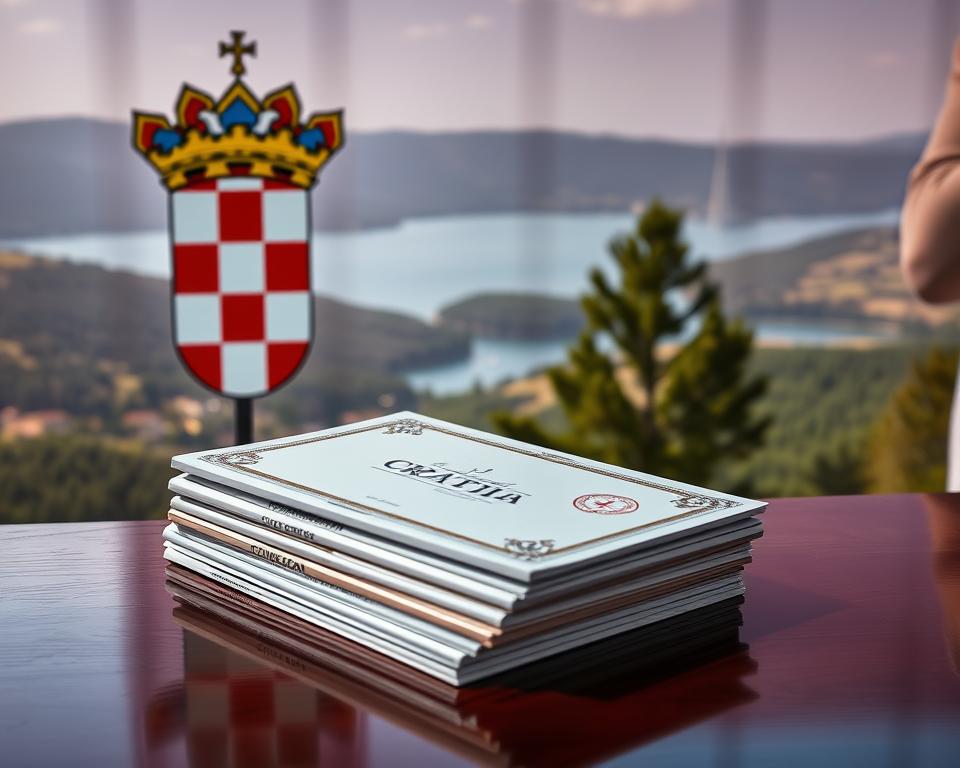Imagine waking up to the sound of waves gently lapping against the shore, surrounded by the historic charm and natural beauty of Croatia. For many, this idyllic lifestyle is becoming a reality through Croatian citizenship. As Croatia’s popularity grows among investors and expatriates, so does the interest in its residency-to-citizenship pathway.
Croatia offers a unique blend of Mediterranean lifestyle, EU membership benefits, and economic opportunities, making it an attractive destination. While it doesn’t offer direct citizenship through a “golden visa” scheme, a period of legal residency can lead to naturalization. Understanding the nuances of acquiring Croatian citizenship is crucial for investors considering this beautiful Adriatic nation as their second home or business base.
Table of Contents:
- Understanding Croatian Citizenship Options
- Benefits of Croatian Citizenship
- Residency Requirements for Croatian Citizenship
- Investment Options for Obtaining Residency
- The Step-by-Step Process to Citizenship by Investment Croatia
- Documentation and Legal Requirements
- Taxation and Financial Considerations
- Limitations and Challenges
- Conclusion
Understanding Croatian Citizenship Options
The path to Croatian citizenship involves several routes, each with its own set of requirements and benefits. Understanding these options is crucial for individuals seeking to apply for Croatian citizenship.
The Reality of “Citizenship by Investment” in Croatia
Croatia does not offer a direct “citizenship by investment” program like some other countries. Instead, the process involves obtaining residency through investment or other means, followed by a period of legal residence before being eligible to apply for citizenship. As emphasized by a recent statement, “Investing in Croatia can be a strategic move, but it’s essential to navigate the legal pathways to citizenship carefully.”
Paths to Croatian Citizenship
There are multiple pathways to acquiring Croatian citizenship. Citizenship can be obtained by birth or origin, where a child born in Croatia to at least one Croatian citizen automatically acquires citizenship. Similarly, children born abroad to Croatian parents can claim citizenship by descent. For those without Croatian ancestry, naturalization is an option after at least 8 years of legal residence in Croatia. Additionally, spouses of Croatian citizens can apply for citizenship after just one year of legal residence, making marriage a significantly faster route for those with family connections.
To summarize, the main paths include citizenship by birth or descent, marriage to a Croatian citizen, and naturalization after maintaining legal residency. Each pathway has its requirements, such as demonstrating integration into Croatian society, including knowledge of the Croatian language and culture for naturalization applicants.
Benefits of Croatian Citizenship
Becoming a Croatian citizen opens up a world of opportunities, from accessing the EU market to enjoying a high standard of living. Croatian citizenship is a gateway to numerous benefits that can significantly enhance one’s lifestyle and global mobility.
EU Membership Advantages
As a member of the European Union, Croatian citizens enjoy the rights and privileges associated with EU membership. This includes the freedom to live, work, and study in any EU country. EU citizens can also obtain a European Health Insurance Card, which provides medical coverage in other EU countries, Iceland, Liechtenstein, Norway, Switzerland, and the UK, at the same conditions and cost as locals.
Croatian Passport Strength
The Croatian passport is highly regarded globally, offering visa-free travel to numerous countries. This makes it an attractive asset for individuals who value travel freedom. Croatian citizens can explore the world with ease, whether for leisure, business, or education.
Quality of Life Benefits
Croatia is known for its safety and tranquillity, ranking 14th on the 2023 Global Peace Index. It offers an exceptional quality of life, with a low cost of living compared to other European countries. A single person can live comfortably in Croatia on approximately €1,200 per month. The country’s strategic location, Mediterranean climate, stunning coastline, and rich cultural heritage contribute to an enviable lifestyle.
Croatian citizens also enjoy access to the country’s universal healthcare system and can obtain the European Health Insurance Card. The country’s proximity to neighboring countries like Slovenia, Hungary, Serbia, Montenegro, and Bosnia and Herzegovina makes it an ideal location for those who wish to explore the region.
Residency Requirements for Croatian Citizenship
To become a Croatian citizen, one must first navigate the country’s residency regulations. Understanding the different types of residency permits and their requirements is essential for a successful application.
Temporary Residence Permit
A foreigner can apply for a temporary residence permit after residing in Croatia for a certain period. The application is submitted at a police administration or station according to the foreigner’s place of temporary residence. To qualify, applicants must have a valid foreign travel document, prove financial means to support themselves, have health insurance, and demonstrate knowledge of the Croatian language and the Latin script.
The initial temporary residence permit is usually granted for one year and can be renewed.
Permanent Residence Status
After maintaining temporary residence for five consecutive years, foreign nationals become eligible to apply for permanent residence status in Croatia. The application must be submitted at the police administration or station corresponding to the applicant’s place of residence.
- Applicants must demonstrate financial self-sufficiency and maintain comprehensive health insurance coverage.
- They must also pass an examination proving proficiency in the Croatian language and Latin script.
- Permanent residents enjoy enhanced rights, including indefinite stay permission and unrestricted work authorization.
After holding permanent residence status for at least three years, individuals become eligible to apply for Croatian citizenship through naturalization, bringing the total residency period to at least eight years.
Investment Options for Obtaining Residency

Croatia offers several investment pathways to obtain residency, catering to different investor needs. Two primary options are available: establishing a company in Croatia and investing in real estate.
Establishing a Company in Croatia
Setting up a Croatian company is a straightforward way to obtain temporary residency. This involves registering the business and fulfilling the necessary legal requirements. The process allows for flexibility in terms of the type of business and its size.
Real Estate Investment Path
Investing in real estate is another viable option for obtaining residency. The key requirements include purchasing a property that will serve as the applicant’s residence and obtaining legal ownership. Unlike some other golden visa programs, Croatia does not specify a minimum investment threshold for real estate.
- Unlike many golden visa programs, Croatia’s real estate path to residency doesn’t mandate a specific investment amount but requires that the property serve as the applicant’s actual residence.
- The real estate must be legally owned by the applicant and suitable for residential purposes, with proper documentation proving ownership and habitability.
- This pathway requires genuine residence in the property, making it more appropriate for those planning to spend significant time in Croatia rather than purely investment-focused buyers.
- The initial residence permit obtained through real estate ownership is valid for one year and must be renewed annually, with each renewal requiring proof of continued property ownership and actual residence.
- While this option offers flexibility in terms of investment amount, it comes with stricter physical presence requirements than some other investment-based residency programs in Europe.
The Step-by-Step Process to Citizenship by Investment Croatia
The journey to Croatian citizenship by investment involves several key stages, from initial residency to final citizenship approval. This process is designed to integrate foreign investors into Croatian society while ensuring they comply with legal requirements.
Initial Residency Application
The first step towards Croatian citizenship is obtaining a temporary residence permit. This involves submitting an application along with required documentation, such as proof of investment, health insurance, and a clean police record. Establishing a company or investing in real estate are common paths to securing residency.
Maintaining Legal Residency
After obtaining a temporary residence permit, it’s crucial to maintain legal residency status. This typically involves renewing your residence permit periodically and ensuring compliance with Croatian laws and regulations. Continuous residence in Croatia is a prerequisite for eligibility for permanent residency and, eventually, citizenship.
Applying for Citizenship After Residency
After maintaining permanent residence status for at least three years, you become eligible to apply for Croatian citizenship. The application must be submitted in person at the local police department, accompanied by comprehensive documentation, including proof of language proficiency and knowledge of Croatian culture. Upon approval, registration in the Registry of Citizens is required, followed by obtaining a citizenship certificate.

The entire process, from initial residency to citizenship, requires patience and diligence. However, the benefits of Croatian citizenship, including EU citizenship and the associated rights and privileges, make the investment worthwhile.
Documentation and Legal Requirements
Obtaining Croatian citizenship through investment requires careful preparation and adherence to specific documentation and legal requirements. Applicants must ensure they meet all the necessary criteria to avoid delays or rejection of their application.
Required Documents for Residency
To apply for residency in Croatia, applicants must provide a valid foreign travel document, proof of financial means to support themselves, health insurance, and demonstrate knowledge of the Croatian language and the Latin script. Additionally, they must not pose a threat to public order or national security. The required documents typically include a passport, birth certificate, and proof of health insurance.
Croatian Language and Cultural Knowledge Requirements
Proficiency in the Croatian language and knowledge of Croatian culture are mandatory requirements for citizenship applicants. Formal testing is typically required at the permanent residency application stage. The language examination assesses the applicant’s ability to communicate in everyday situations in Croatian using the Latin script, with the expected proficiency level being approximately A2 on the Common European Framework of Reference for Languages.
- The language examination assesses the applicant’s ability to communicate in everyday situations.
- Cultural knowledge assessment includes questions about Croatian history, geography, and traditions.
- Early preparation for these requirements is advisable to ensure sufficient proficiency.
By understanding and meeting these documentation and legal requirements, applicants can successfully navigate the path to Croatian citizenship.
Taxation and Financial Considerations
The financial implications of obtaining Croatian citizenship are multifaceted and warrant careful consideration. As investors navigate the process, understanding the tax landscape is essential for making informed decisions.
Personal Income Tax in Croatia
Croatia’s personal income tax system is progressive, with rates ranging from 0% to 40%. Residents are taxed on their worldwide income, while non-residents are taxed only on income derived from Croatian sources. This progressive system means that higher income earners are taxed at a higher rate.
Corporate Tax Structure
Croatia offers a competitive corporate tax rate of 10% or 12% for small and medium-sized enterprises, promoting a favorable business environment. The standard corporate tax rate applies to most businesses, encouraging foreign investment.
Property and Other Taxes
Real estate transactions in Croatia attract either a 3% property transfer tax for existing properties or 25% VAT for new properties. There is no annual property tax, making long-term ownership relatively tax-efficient. Additionally, wealth taxes do not exist in Croatia, which can be advantageous for high-net-worth individuals.

As highlighted by experts, “Understanding the nuances of Croatian tax law is crucial for maximizing the benefits of citizenship by investment.” Investors should consider consulting with tax professionals to navigate these complexities effectively.
Limitations and Challenges
While Croatia offers an attractive pathway to EU citizenship, there are significant limitations and challenges that applicants must consider. Understanding these aspects is crucial for potential applicants to make informed decisions about their path to Croatian citizenship.
Restrictions on Dual Citizenship
Croatia allows dual citizenship, but applicants should be aware of the laws in their other country of citizenship regarding dual nationality. Some countries do not permit dual citizenship, so it’s essential for applicants to check their eligibility before proceeding with the Croatian citizenship application.
Timeline Considerations
The process of obtaining Croatian citizenship through naturalization is lengthy, requiring at least eight years of continuous residency. This timeline is significantly longer than some other citizenship by investment programs, such as Portugal’s, which offers citizenship in just five years. Additionally, maintaining legal residency status and complying with physical presence requirements are critical throughout this period.
The prolonged timeline and residency requirements mean that applicants must plan carefully and commit to residing in Croatia for an extended period. Unlike some golden visa programs that have minimal physical presence requirements, Croatia’s path to citizenship demands genuine residence and integration, making it less suitable for those seeking rapid acquisition of a second passport.
- The eight-year residency requirement represents a significant long-term commitment.
- Croatia’s citizenship process requires continuous legal residency and physical presence.
- For investors seeking quick access to EU citizenship, alternative programs might be more appropriate despite higher investment thresholds.
In conclusion, while Croatian citizenship offers numerous benefits, the limitations and challenges associated with its acquisition should not be overlooked. Potential applicants must weigh these factors carefully, considering their long-term goals and circumstances.
Conclusion
The journey to Croatian citizenship through investment requires patience, commitment, and a genuine connection to the country. While it’s not a quick fix, the benefits of Croatian citizenship, including a strong passport and EU freedom of movement, make it an attractive option for many.
To successfully navigate this process, it’s essential to understand the specific requirements, including Croatian language proficiency and substantial physical presence obligations. For those willing to establish genuine ties to Croatia through business investment or real estate ownership, this path offers a relatively affordable entry point to EU citizenship.
If you’re considering this path to Croatian citizenship and EU membership, we recommend getting in get touch with specialists who can provide personalized advice based on your specific circumstances and objectives.

